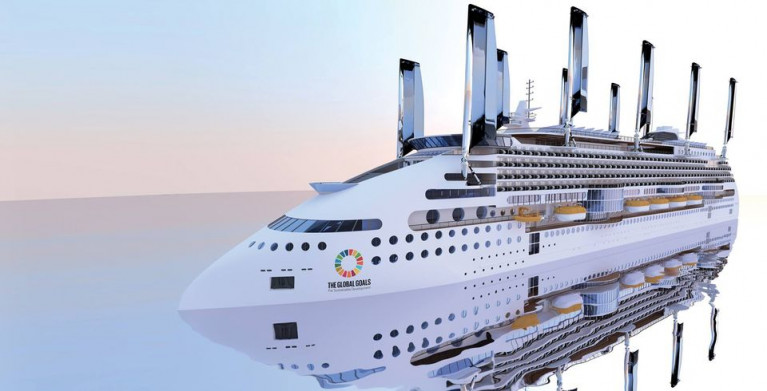Displaying items by tag: Transformational Cruiseship
Peace Boat, the Japan-based international NGO that works to promote peace, human rights and sustainability is taking part in COP26's Virtual Ocean Pavillion which includes their EcoShip project, a transformational programme to construct the planet’s most environmentally sustainable cruiseship.
In this year's COP conference, Peace Boat and Ecoship will be partnering with other civil society organizations to call for increased ambition on climate action, participating in events in the UNFCCC administered Blue Zone, in public areas of the city of Glasgow, and virtually with a booth at the COP26 Virtual Ocean Pavillion.
The Pavillion will feature the 'Overview of Peace Boat Engagement at COP 26' which also focuses on the Peace Boat Ecoship – Sailing for the UN's Sustainable Development Goals (SDGs) and Climate Action. This online event is take place today between 1:15 – 1:45 PM at the SDG Pavilion, Blue Zone.
The EcoShip - below is an outline of the newbuild project.
The Ecoship is a 60,000 ton, 2000 passenger capacity, nature-inspired vessel with a 40% reduction in CO2 emissions achieved through renewable technologies and energy efficiency.
Closed water and closed waste loop systems onboard will mean zero discharge and close to zero waste to reduce marine pollution.
The Ecoship will be the platform for Peace Boat’s round-the-world educational voyage carrying 6,000 people per year, host exhibitions on green technology in up to 100 ports per year; and serve as a floating sustainability laboratory contributing to research on the ocean, climate and green marine technology.
The ship also will create awareness and encourage active engagement with the challenges embodied in the UN’s Sustainable Development Goals (SDGs).
Building the planet’s most environmentally sustainable ocean-going cruise ship implied a radically different approach, with particular emphasis on the choice of technologies. The design of the ship was finalized after a three-year, whole-system design process that brought together experts from fields as diverse as naval architecture, renewable energy, and biophilic and biomimetic design.
The goal – to define the specifications for a vessel where radical energy efficiency and maximised use of renewables combine with a programme of activities and actions to deliver a highly visible demonstration of sustainability-in-action in every port that it visits.
Learn more about Peace Boat's Ecoship project through their dedicated website here.





























































